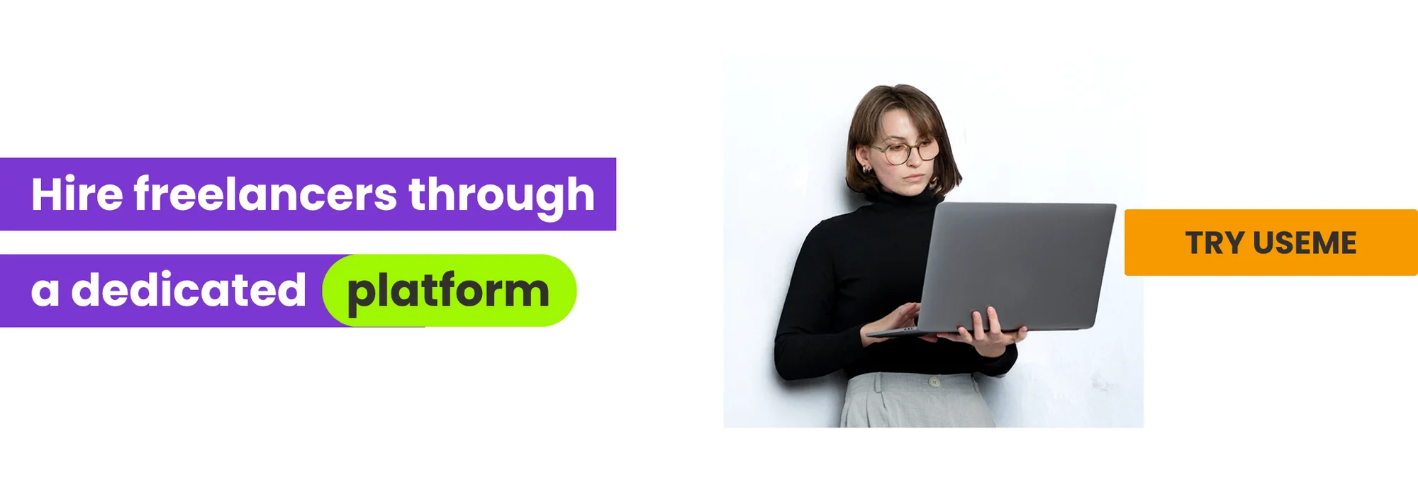Introduction: Why is it good to collaborate with freelancers?
Outsourcing is now a smart way for both businesses and freelancers to grow. Companies use freelancers to scale fast, reduce costs, and access specialized skills without hiring full-time staff. Freelancers use these platforms to find steady work, build portfolios, and reach clients worldwide.
Upwork is a popular platform for connecting both freelancers and clients. It offers experts in design, writing, IT, and marketing. Still, it’s not perfect. The platform charges from 5% to 20% in fees, depending on the project. Many users also complain about slow customer support and a complex dispute system. On Trustpilot, Upwork holds an average rating of 1.9 stars (November 2025), primarily from freelancers and clients who are frustrated by high costs, poor assistance, or account issues.
As a result, many freelancers and companies are now seeking Upwork alternatives that offer lower costs, faster payments, and easier tools for managing work.

Factors to consider when searching for an Upwork alternative:
Before you explore the best sites like Upwork, it helps to know what really matters when choosing a platform. Think about:
- Global reach: Is the platform available worldwide? Does it let you hire foreign freelancers?
- Speed of starting projects: How quickly can you find, hire, and pay freelancers?
- Safety: Is the platform safe for both: freelancers and clients? How does the tool ensure compliance?
- CRM tools: Does the platform offer tools to organize documents, teams, invoices?
- Automation: Are there tools for speeding up the payment process, managing contracts, issuing invoices?
One platform that stands out in terms of unique features is Useme, which allows freelancers without a company to issue invoices – something not all freelance marketplaces offer.
Now, let’s dive into some of the top alternatives to Upwork and how they compare.
Top alternatives to Upwork
1. Useme
What is Useme?
Useme is a European-based platform designed for freelancers and clients, with a focus on simplifying the process of settling deals between them. It bridges the gap between freelancers and corporations in the areas of matchmaking, compliance, and fast transfer of work, funds and copyrights. Useme lets freelancers issue invoices even if they don’t have a registered business, which makes it easier for clients to handle administrative tasks fast & legally.
Freelancers can register, create a profile and upload a portfolio for free, making it easier to be found by clients. Clients have access to a comprehensive dashboard with all the freelancers they work with, historical files, documents, invoices, payment statuses and contract details. The platform has a clean, user-friendly interface that makes managing projects, contracts, and payments simple even for first-time users.
Useme is part of a global network of freelancers offering various services such as graphic design, copywriting, and web development, making it a versatile choice for businesses.

Pros for Freelancers:
- Ability to invoice clients without registering a business.
- Ability to transfer copyright fast and fully online.
- In most cases, lower fees compared to Upwork (Upwork freelancers need to pay a 10% service fee on the earnings they make on Upwork, while Useme freelancers pay only 4.99%, and service fees stop at €99 per month, unlocking free deals).
- Most payments are made within 24h.
Cons for Freelancers:
- No mobile app: Useme doesn’t have a mobile app which makes it a bit more difficult to use on mobile devices.
- Lower job volume: Compared to platforms like Upwork, Useme has fewer job postings, especially for certain industries or niches.
Pros for Clients:
- One of the most simple platforms to account remote one-offs – you don’t even need an account, the deal can be completed from email.
- Easy access to the marketplace and the ability to add your own orders for free.
- Ability to pay all freelancers with just one transfer and relieve one, summary invoice per month.
Cons for Clients:
- Smaller remote talent: Clients might find fewer freelancers on Useme, particularly in highly specialized fields.
- Less project management features: While it simplifies invoicing, Useme doesn’t offer robust tools for project management, like kanbans or time tracking.
Pricing:
Useme charges a commission fee, often lower than Upwork’s. For freelancers its 4.99% and stops at €99 per month, unlocking free deals. For clients, according to their new pricing its 4.6% and the more freelancers you pay, the less is your service fee.
How it compares to Upwork:
Useme offers better prices for both, freelancers and clients. Both platforms have a marketplace. Upwork states to make payments 5 days after the payment is successfully processed, while in most cases Useme freelancers get the funds within 48h.
Although Upwork offers a service to find freelancers for you, Useme is currently developing a number of features that will give customers a daily dose of suggestions from freelancers they can add to their team. Useme is a good option for freelancers when it comes to invoicing, making it a better fit for worldwide clients or freelancers who don’t want to form a business entity. Its fee structure is simpler and often cheaper.
Why is Useme a better alternative to Upwork?
When it comes to Useme, there’s no platform dependency for clients. Freelancers can invoice clients they find anywhere – whether through personal connections, other platforms, or even direct clients. You aren’t restricted to finding clients through Useme itself.
2. Fiverr
What is Fiverr?
Fiverr is a well-known online platform that connects businesses with freelancers who provide a wide variety of services. From creative fields like graphic design and writing to technical areas such as programming and digital marketing, Fiverr serves as a one-stop shop for companies looking to hire skilled professionals.
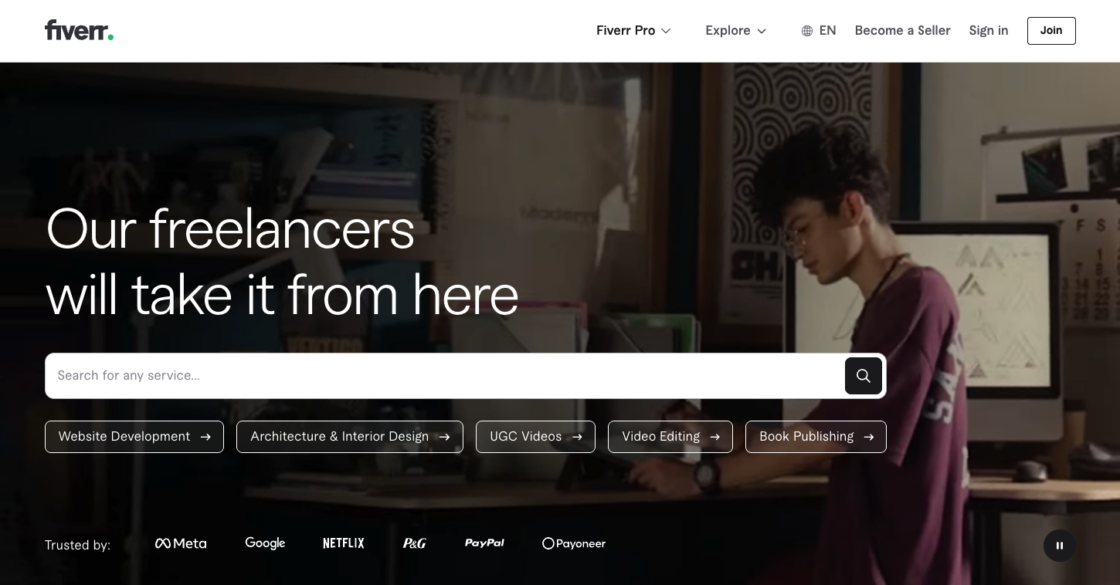
It operates on a gig-based model where freelancers offer predefined services (gigs) at set prices, starting at $5. It’s popular for creative services such as logo design, voiceovers, and copywriting. Additionally, Contra is another platform that caters to creatives and tech freelancers, offering a commission-free, portfolio-based model that eliminates the need for bidding.
Pros for Freelancers:
- Set your own gig prices.
- Low barrier to entry, making it easier to get started.
- Built-in messaging features that facilitate communication between freelancers and clients
Cons for Freelancers:
- High competition: The gig-based model means freelancers face significant competition, especially for popular services, which can drive down prices.
- Fiverr is known for very poor customer support.
Pros for Clients:
- Affordable options, especially for small tasks.
- Predefined services simplify the hiring process.
- Access to a wide variety of skills, from design to marketing.
Cons for Clients:
- Inconsistent quality: Due to the open nature of Fiverr, clients may experience varying levels of quality, with some freelancers lacking professional skills.
- Lack of long-term project management tools: Fiverr is best for one-off tasks, so managing larger or ongoing projects can be difficult compared to platforms with more robust tools.
Pricing:
Fiverr charges a commission of 20% on every transaction, which means freelancers ultimately receive 80% of the fee they set for their services.
How it compares to Upwork:
Fiverr is generally more affordable and faster for smaller, task-based work. However, for long-term or highly specialized projects, Upwork’s project-based system may offer more depth.
Why is Fiverr a better alternative to Upwork?
For quick, inexpensive projects, Fiverr is ideal. It’s faster and often cheaper than Upwork, though it’s not designed for large, ongoing projects.
3. Freelancer.com
What is Freelancer.com?
Freelancer.com is one of the oldest freelancing platforms and offers a range of freelance services across various categories. It operates similarly to Upwork, allowing freelancers to bid on projects but also lets clients post their own jobs. For businesses seeking specialized WordPress developers, Codeable is a standout option, connecting clients with vetted professionals through a stringent selection process.
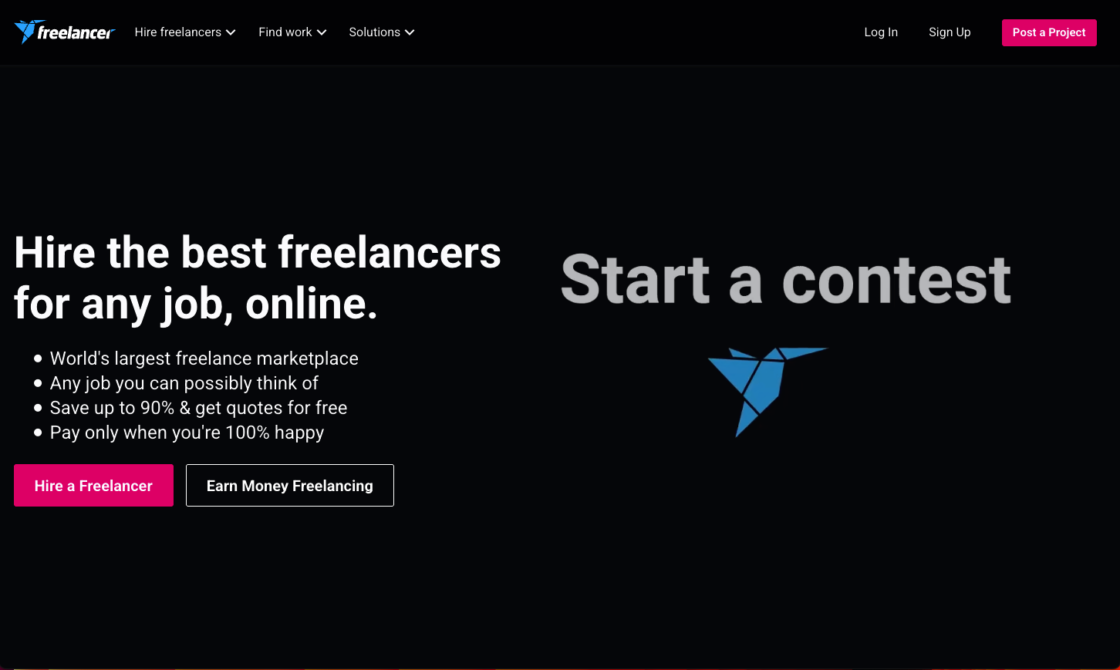
Pros for Freelancers:
- Large client user base with many project opportunities.
- Freelancers can bid on multiple jobs to maximize earnings.
Cons for Freelancers:
- High competition and bidding wars: Similar to Upwork, Freelancer uses a bidding system, making it hard for new freelancers to compete, which can result in underbidding and lower earnings.
- Frequent fees: There are multiple types of fees, including project fees, contest fees, and membership costs, which can quickly add up.
Pros for Clients:
- Extensive pool of freelancers from around the world.
- Competitive pricing due to the bidding system.
Cons for Clients:
- Quality concerns: With freelancers competing heavily on price, quality can suffer, especially when hiring for specialized tasks.
- Complicated user experience: Some clients report that the platform can be difficult to navigate and that the bidding process is time-consuming.
Pricing:
On Freelancer, the fees you incur depend on whether you hire a freelancer for a fixed-price job or an hourly task. For fixed-price projects, you will be charged either 3% of the total amount or a minimum fee of $3, whichever is higher. In contrast, for hourly projects, a fee of 3% applies to each payment made to the freelancer.
How it compares to Upwork:
Freelancer is similar in structure to Upwork, with a bidding system and wide talent pool. However, some clients report that quality can be inconsistent due to the high volume of freelancers. Freelancer also features a secure payment system that can reassure both freelancers and clients.
Why is Freelancer a better alternative to Upwork?
Freelancer offers a comparable service but often at a lower cost, making it an appealing Upwork competitor for businesses seeking competitive bids.
4. Guru.com
What is Guru?
Guru is a freelance marketplace focused on long-term professional relationships. It offers tools like workroom tools designed to facilitate efficient and organized collaboration between freelancers and clients. These tools help manage projects from start to finish, enabling seamless communication, task tracking, and file sharing. Guru also offers features such as secure payment systems and flexible payment agreements for better collaboration between freelancers and clients.

Pros for Freelancers:
- Flexible payment options: hourly, task-based, or recurring.
- Lower fees than Upwork.
- Focus on building long-term client relationships.
Cons for Freelancers:
- Less traffic than Upwork: Guru has fewer active clients than larger platforms like Upwork or Freelancer, which can result in fewer job opportunities.
- Fees for withdrawals: In addition to platform fees, freelancers face fees when withdrawing funds from the platform, which reduces earnings.
Pros for Clients:
- Integrated project management tools.
- Secure payment methods with milestone features.
Cons for Clients:
- Smaller talent pool: Guru’s freelancer base is smaller compared to Upwork, meaning it may take longer to find the right freelancer for highly specialized jobs.
- Limited support: While Guru offers customer support, some clients find it slower and less comprehensive than other platforms, which can be an issue when disputes arise.
Pricing:
Guru charges a 5-9% commission on earnings, depending on the membership level.
How it compares to Upwork:
Guru’s fee structure is more freelancer-friendly than Upwork’s, and its project management tools make it ideal for larger, ongoing projects.
Why is Guru a better alternative to Upwork?
With lower fees and robust management tools, Guru is a strong option for businesses that want a long-term solution for managing freelancers.
5. TopTal
What is TopTal?
Toptal is a high-end freelance platform specializing in top-tier talent. It vets freelancers rigorously, accepting only the top 3% of applicants. This highly selective process makes Toptal a go-to choice for businesses seeking elite professionals, particularly in fields such as software development, design, finance, and project management.

Pros for Freelancers:
- Access to premium clients.
- Higher pay rates due to the platform’s exclusivity.
Cons for Freelancers:
- Exclusive vetting process: Only the top 3% of applicants are accepted, so it’s extremely difficult for freelancers to get on the platform.
- High client expectations: Due to the premium nature of the platform, freelancers are expected to deliver at an elite level, which can add significant pressure.
Pros for Clients:
- Guaranteed high-quality talent.
- Excellent customer support.
Cons for Clients:
- Expensive: TopTal’s freelancers charge significantly higher rates than those on platforms like Upwork or Fiverr, making it unsuitable for smaller businesses with limited budgets.
- Smaller pool of freelancers: While the quality is high, the limited number of freelancers means fewer options for niche or less common skill sets.
Pricing:
Freelancers retain 100% of their agreed-upon rates. Toptal operates differently from many freelance platforms because it doesn’t charge freelancers a fee directly for using the platform. Instead, Toptal chargers clients for access to top-tier talent. Typically, the hourly rate for freelancers on Toptal ranges from $60 to $250+ per hour. Toptal charges a markup on the freelancer’s rate, but this fee is built into the overall rate clients pay. The exact percentage of the markup is not disclosed.
How it compares to Upwork:
While TopTal is pricier than Upwork, the platform ensures that clients work with top-tier talent, making it a better choice for high-stakes projects.
Why is TopTal a better alternative to Upwork?
TopTal guarantees a level of freelancer quality that Upwork cannot, making it perfect for businesses that need elite talent and are willing to pay for it.
6. PeoplePerHour
What is PeoplePerHour?
PeoplePerHour focuses on hourly contracts and is popular for small- to medium-sized businesses in need of flexible freelance help. For designers, Dribbble is another excellent platform, featuring a job board and portfolio showcase that allows creative professionals to connect with potential clients.

Pros for Freelancers:
- Flexible work arrangements (hourly or per project).
- Easy-to-use platform with clear job listings.
Cons for Freelancers:
- Fees start high: Freelancers face a 20% commission rate on their first £250 earned with each client, which is comparable to Upwork’s fee structure and reduces initial earnings.
- Fewer job opportunities: The platform is smaller than Upwork, meaning freelancers may not find as many available projects, especially in niche areas.
Pros for Clients:
- Lower fees than Upwork.
- Flexible hiring for both short-term and long-term projects.
Cons for Clients:
- Less diversity in talent: The platform is more popular in Europe, which can limit access to a truly global freelancer pool.
- Limited project management tools: PeoplePerHour lacks some of the advanced project management tools offered by platforms like Upwork or Guru, which can make it harder to track long-term or complex projects.
Pricing:
Freelancers on PeoplePerHour are charged a service fee based on their earnings from clients. The platform uses a sliding scale fee structure that reduces as freelancers earn more with a single client in a monthly period.
- Over £5000-lifetime billing per buyer: 3.5% (excl. VAT) service fee
- Between £250 and £5000-lifetime billing per buyer: 7.5% (excl. VAT) service fee
- Below £250-lifetime billing per buyer: 20% (excl. VAT) service fee
How it compares to Upwork:
PeoplePerHour is a more affordable platform for clients and freelancers alike, though it may not have the same project volume or variety as Upwork. PeoplePerHour offers a platform that specializes in project-based work, allowing businesses to find freelancers for quick turnaround times.
Why is PeoplePerHour a better alternative to Upwork?
For businesses looking for flexible hiring and lower costs, PeoplePerHour offers a solid alternative to Upwork.
7. HubStaff Talent
What is HubStaff?
HubStaff is not just a freelance marketplace but also a time tracking, productivity, and project management tool for remote teams. Hubstaff focuses more on managing remote work once the hiring process is complete.
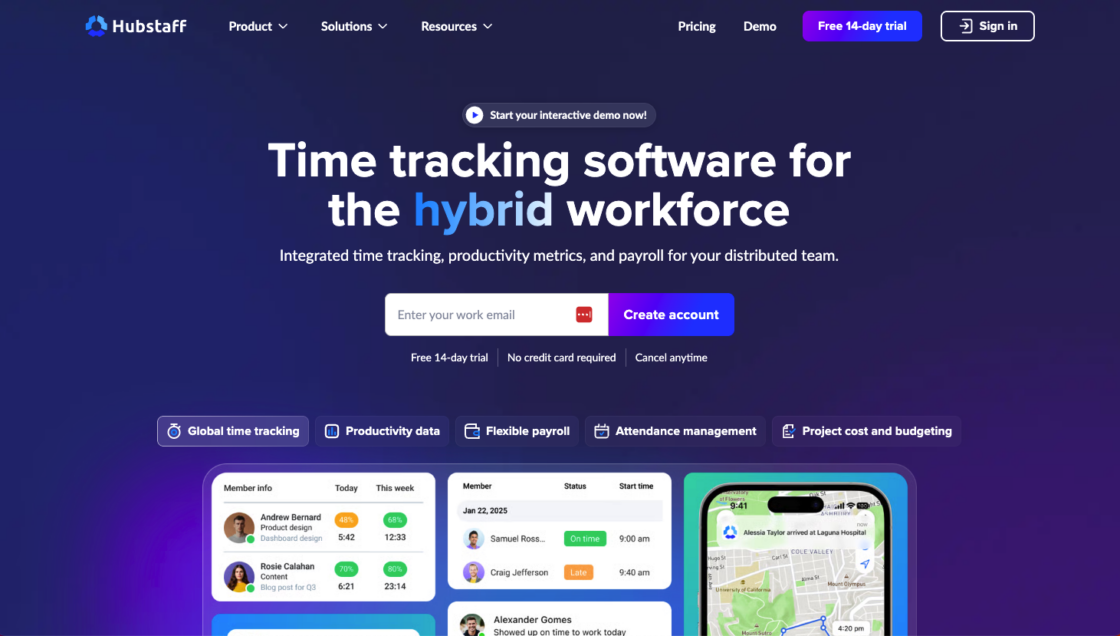
Pros for Freelancers:
- No fees – freelancers keep 100% of their earnings.
- Access to HubStaff’s time-tracking and project management tools.
Cons for Freelancers:
- Smaller platform: HubStaff Talent has a smaller user base and fewer jobs posted compared to larger platforms like Upwork, making it harder for freelancers to find consistent work.
- Lack of promotional tools: The platform doesn’t offer as many ways to promote freelancer profiles, which can limit visibility and job offers.
Pros for Clients:
- Free to use for hiring freelancers.
- Integrated time-tracking and project management.
Cons for Clients:
- Limited talent pool: Since HubStaff Talent is relatively small, clients may struggle to find highly specialized talent for niche projects.
- Fewer advanced hiring features: While the platform is free, it lacks some of the hiring tools that paid platforms offer, such as advanced search filters or skill verification.
Pricing:
Clients pay for freelancer seats. Depending on the plan a seat costs from $4 to $25 per month. It also offers a free plan with basic time and activity tracking features for solo users.
How it compares to Upwork:
HubStaff stands out as one of the few truly free platforms, though it doesn’t have as large a talent pool as Upwork.
Why is HubStaff a better alternative to Upwork?
While Upwork has a time tracker for hourly contracts, Hubstaff’s system is much more robust and granular, allowing for detailed oversight of workers’ productivity. It offers optional screenshots to verify work or activity levels based on mouse and keyboard use.
Comparison Table: Pros and Cons of Top Upwork Alternatives
| Platform | Pros for Freelancers | Cons for Freelancers | Pros for Clients | Cons for Clients |
|---|---|---|---|---|
| Useme | Invoice without a company; fast copyright transfer; low 4.99% fee; payments in 24h | No mobile app; smaller job volume | Simple invoicing; one transfer for all freelancers; free order posting | Smaller talent pool; limited project management tools |
| Fiverr | Set your own gig prices; easy to start; built-in messaging | High competition; poor customer support | Affordable for small tasks; predefined services; wide skill range | Inconsistent quality; no long-term project tools |
| Freelancer.com | Many projects; global client base | Bidding wars; multiple fees | Wide talent pool; competitive pricing | Quality varies; complex interface |
| Guru | Flexible payment terms; low fees; focus on long-term clients | Less traffic; withdrawal fees | Integrated project tools; secure payments | Smaller pool; limited support |
| TopTal | Access to premium clients; higher pay | Very selective; high pressure | Elite talent; excellent support | Expensive; limited freelancer options |
| PeoplePerHour | Flexible hourly or project work; simple listings | High initial fees; fewer projects | Lower fees; flexible hiring | Limited diversity; few management tools |
| HubStaff Talent | No platform fees; includes time tracking | Smaller user base; low visibility | Free hiring; project management tools | Limited talent pool; lacks advanced hiring filters |
What do others say?
When listing alternatives to Upwork, it is also worth understanding why business owners are looking for alternatives to Upwork. Perhaps this will inspire you in the context of finding a well-suited alternative.
Upwork is just not a great place to find high quality talent, at least not quickly. They had a change in the application process, so now someone has to use credits to apply, which should have prevented bad applicants, but this wasn’t the case. To get good talent from Upwork, you need to: create a very specific, detailed job ad; explain what “good work” means; add a small challenge for the applicant (e.g. tell me your favorite ice cream flavor so I know you read the task); explain who you do NOT want to hire. I think Upwork would be better if we could choose the specific categories of users who can view the job ads so not everyone has the chance to apply.
– Daniel Kroytor, CEO of Tailored Pay
I use Upwork for digital marketing and finding specialists for healthcare is tough. So many profiles are just generic noise. At my company Plasthetix, we finally got better applicants when we wrote clearer job posts and requested samples. Upwork should add verified niche skill tags or let us filter portfolios better. The review system needs to show what people actually delivered on past projects, not just a generic feedback score.
– Josiah Lipsmeyer, Founder, Plasthetix Plastic Surgery Marketing
Some projects trigger a rush of proposals the moment they go live. A client logs in and is immediately staring at a long wall of pitches. After a few minutes, the messages blur together and they start skimming or ignoring strong candidates simply because the volume is overwhelming.
Organizing proposals based on skill relevance, past project alignment, and work quality patterns would be a better approach. This structure helps clients feel more calm as they evaluate talent. Strong freelancers stop getting buried, and clients regain energy to consider each fit carefully.
Ryan Beattie, Director of Business Development at UKSARMs, Owner/Director at Bear Wellbeing
Upwork competitors for design and marketing
If you’re looking for Upwork alternatives specifically for freelance jobs in design and marketing projects, you can also consider the following platforms:
8. 99Designs
99Designs is one of the leading freelance websites specializing in design services, including logo design, graphic design, and web design. With a large pool of talented designers, 99Designs offers a range of design services to suit various business needs. The platform operates on a contest-based model, allowing clients to choose from multiple design submissions, ensuring they get the best possible outcome for their projects.

9. Contently
Contently is a platform that connects businesses with top freelance services, including writers, editors, and content strategists. With a focus on high-quality content creation, Contently offers a range of services, including blog writing, copywriting, and content marketing. The platform is known for its rigorous vetting process, ensuring that clients work with only the best content professionals.

10. DesignCrowd
DesignCrowd allows clients to host design contests and receive dozens of creative proposals from designers worldwide. It’s ideal for brands that want a variety of visual ideas before choosing one. Clients can set budgets, compare entries, and select the best design through a transparent voting or review process. The platform focuses on logos, print materials, and digital branding assets. According to DesignCrowd’s official site (2025), the community includes over 1 million designers and has completed over 600,000 projects globally. This contest-based model helps businesses discover new creative talent at flexible prices.
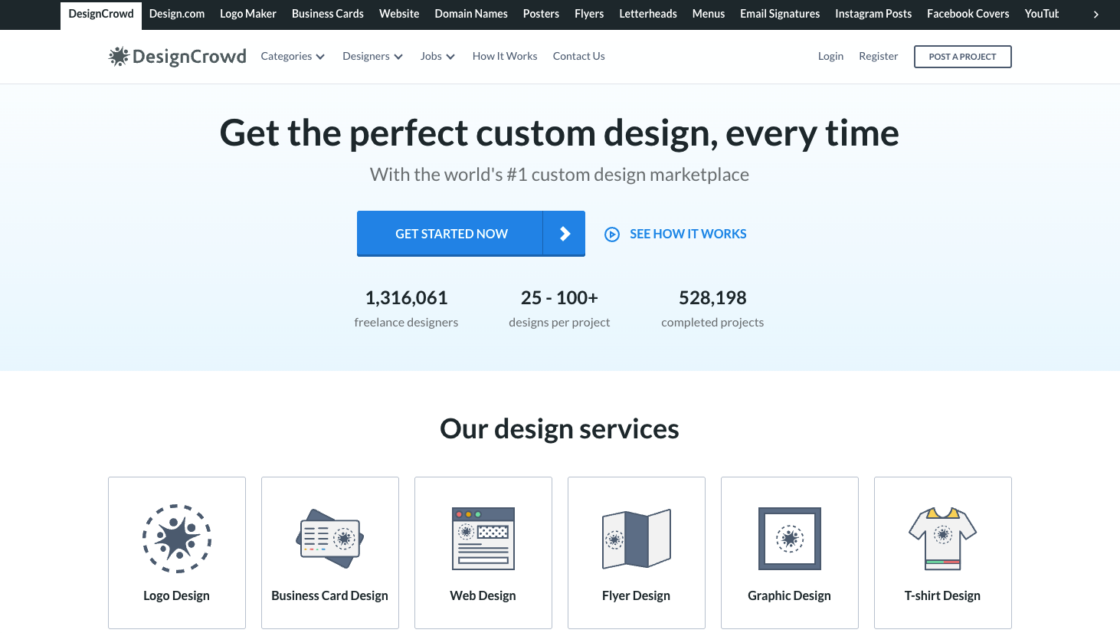
11. Skyword
Skyword offers specialized services for businesses seeking experienced content marketing experts. It connects brands with writers, strategists, and editors focused on long-form storytelling and SEO-driven content.

Upwork alternatives for tech & software development
Finding skilled developers is one of the most challenging tasks for startups and growing tech companies. While Upwork offers a large pool of IT freelancers, its bidding system and fees can slow down hiring. The other freelance platforms below focus specifically on software development and engineering. They offer vetted experts, faster matching, and higher quality control – ideal for businesses that need reliable tech talent for complex projects.
12. Gun.io
Gun.io focuses on software engineers and developers. It’s great for clients who need technical talent for web development, mobile apps, and software projects.

13. Gigster
Gigster specializes in custom software development and assembles teams of developers and project managers for tech projects. It’s a good fit for larger tech builds or complex development tasks.

14. Lemon.io
Lemon.io is a niche-specific freelance platform that specializes in software development, web development, and other IT-related services. The platform offers a curated network of skilled professionals, ensuring that clients have access to top talent for their projects.

Summary of other niche-specific Upwork competitors
- Legal/Finance: LawClerk, Upcounsel
- Data Science/AI: Braintrust
- Consulting/Business: Clarity.fm, Business Talent Group
- Architecture/Engineering: Archinect, CadCrowd
- Translation/Localization: Gengo
- Virtual Assistant/Administrative Support:
- 20Four7VA employs a team-based approach to provide dedicated virtual assistants to businesses. The company specializes in matching clients with skilled remote workers for tasks like customer service, data entry, scheduling, and e-commerce operations.
- MyOutDesk specializes in providing high-quality virtual assistants with a personalized hiring approach. The platform focuses on matching businesses with trained remote staff for administrative, marketing, and sales support.
- Zirtual provides personalized virtual assistant services by assigning dedicated assistants to each client. It’s ideal for entrepreneurs and small teams who need daily admin help without hiring full-time staff.
FAQ
What are the best sites like Upwork for quick and cheap work?
Try Fiverr. It’s great for small, simple projects and fast delivery.
Which platform has the lowest freelancer fees?
Useme charges only 4.99%, and freelancers stop paying after €99 per month. HubStaff Talent is free for freelancers.
Where can I find the best vetted talent?
TopTal accepts only the top 3% of freelancers. You get premium, pre-screened experts.
How can I avoid bidding wars?
Choose platforms like TopTal, PeoplePerHour, or Useme. You don’t need to fight for projects or underbid others.
How fast can freelancers get paid?
Upwork pays after about five days. Useme transfers money within 24–48 hours after approval.
Which site helps with invoices and taxes?
Useme lets freelancers issue invoices without owning a company. It also handles copyright transfers online.
What’s best for long-term cooperation?
Guru and PeoplePerHour work well for long-term or hourly projects with repeat clients.
Which platform offers time tracking?
HubStaff Talent has built-in time tracking and productivity tools for teams.
What if I need tech or software experts?
Try Gun.io, Gigster, or Lemon.io. They focus on developers and tech projects.
Conclusion: Which platform is the best among Upwork competitors?
Each of these Upwork alternatives offers something unique. These sites like Upwork give both freelancers and businesses more freedom to choose the tools and pricing models that fit their needs. For premium talent, TopTal stands out. If you need invoice handling for freelancers without a business, Useme shines. For quick, task-based work at an affordable price, Fiverr is a clear choice. Ultimately, the best Upwork competitor depends on your project’s needs, budget, and timeline.


